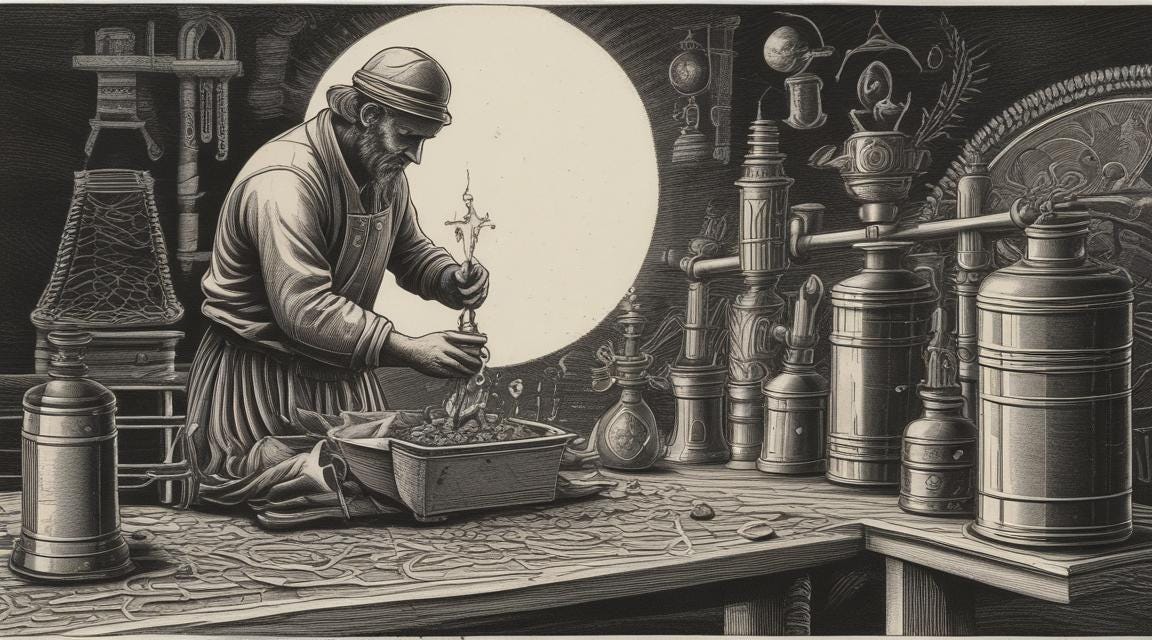Waste not, want not.
Just as alchemists sought to transform base metals into gold, a number of scientists and startups are trying to turn waste into wealth.
They say one man’s trash is another man’s treasure. This quote becomes very literal when you consider that preindustrial workers built entire industries based on human urine—it was so valuable that the ancient Romans not only sold pee collected from public urinals, but those who traded in urine had to pay a tax.
Prior to the ability to synthesise chemicals, urine was a quick and rich source of urea, a nitrogen-based organic compound. When stored for long periods of time, urea decays into ammonia.
Ammonia has a multitude of properties—when added to water, it’s a caustic that breaks down organic material, making it the perfect substance for softening and tanning animal hides. As a base, ammonia is a useful cleanser because dirt and grease—which are slightly acidic—get neutralised. Ancient launderers would use urine as a soaking treatment to get tough stains out of cloth.
Ammonia was also a mordant (a dye fixative), helping to stop natural dyes from leaching by fixing colors to cloth. Urine was so important to England’s textile industry in the 16th century that casks of it were shipped from London to Yorkshire. The production rate required about 200 tonnes of urine per year, the pee of at least 1,000 people.
You’ll be heartened to hear that a French startup, Toopi Organics, is very much keeping the tradition alive. They collect urine and put it in biofermenters, where it becomes a growth medium for microorganisms. The finished product is a bacteria-concentrated liquid that can be used as an effective and environmentally friendly biostimulant for agricultural use.
Toopi is one of many extraordinary companies enabling waste valorisation—the process of reusing, recycling, or composting waste materials and converting them into more useful products, including materials, chemicals, fuels, or other sources of energy.
It might sound like the stuff of science fiction, but thanks to some maverick inventors and an influx of investment, we can now turn air into aviation fuel, corn into bleach, and even cow pats into graphene.
Take Air Company, they’re decarbonising the planet by transforming CO2 into an endless resource, converting carbon into carbon-negative chemicals and fuel. The company is developing technology (dubbed AIRMADE™) that uses (primarily) biogenic CO2 and green hydrogen to produce alcohols and paraffin that are of fuel-grade quality.
Meanwhile, Levidian (another decarbonisation company) has found a way to literally “polish a turd.” Their LOOP technology is a self-contained modular system that can take biomethane (produced from cow slurry) and transform it into clean-burning hydrogen and wonder material graphene.
Solugen have slightly larger ambitions, they’re trying to transform the entire petrochemical industry using biology. They’ve raised over $600 million in venture funding and now have a scaled chemical plant in Houston that uses a “chemienzymatic” approach to turn feedstocks such as dextrose (corn sugar) into tens of thousands of liters of bio-based chemicals, including hydrogen peroxide (bleach), gluconic acid, and glucaric acid.
While Solugen uses sugar as their input, Supplant creates sugar as their output. They’ve developed a biotechnology platform that takes plant waste and uses a single enzyme reaction to produce a cane sugar alternative that has the same physical properties as regular sugar and can be used as a like-for-like substitute in baked goods. As an added bonus, the body processes Supplant Sugar as if it were fibre, so it’s healthy.
And then there’s Pipeline Organics, who use wastewater as a feedstock to produce clean, cheap bioenergy. They’ve created a high-efficiency enzymatic biofuel cell that generates electricity through the breakdown of liquid organic waste during wastewater treatment.
These world-saving companies have only been made possible by scientific advances and extraordinary entrepreneurship. We also have to thank the rising tide of venture capital taking the plunge and investing in circularity—after all, these breakthroughs are not cheap and most will never leave the lab.
This increase in awareness and investment is no doubt buoyed by two geopolitical issues: climate change and national security.
The climate crisis demands a transition to sustainable practices. Both governments and consumers are becoming increasingly climate conscious and showing a growing interest in paying a “green premium” for eco-friendly products and processes.
At the same time, deglobalisation and national security concerns are prompting countries to embrace self-reliance. It’s becoming increasingly important to localise supply chains and maximise the value of domestic resources.
In light of these developments, it’s clear that humanity is on the cusp of a new industrial revolution—one that prioritises sustainability, innovation, and the efficient use of resources. These pioneering companies are not only mitigating the impact of climate change but are also fostering a more self-sufficient and resilient global economy.
The shift towards waste valorisation and the creation of the precious from the mundane is testament to the power of technology and the promise it holds. As we continue to push the boundaries of what’s possible, we must support and invest in these groundbreaking ideas and the visionary entrepreneurs behind them.
As they say, necessity is the mother of all invention.
Till next month.



